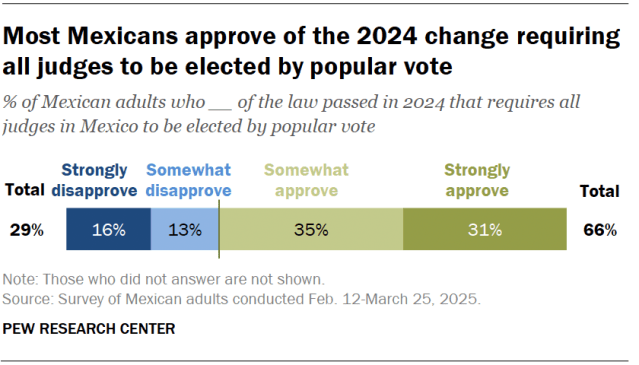
As Mexicans head to the polls in the country’s first-ever judicial elections, two-thirds approve of a 2024 law requiring all judges to be elected by popular vote.

In addition, President Claudia Sheinbaum, former President Andrés Manuel López Obrador and their left-leaning Morena party are widely popular, according to a Pew Research Center survey conducted from Feb. 12 to March 25, 2025.

Last September, a month before the end of his term, López Obrador signed a law mandating that all judges and magistrates in Mexico be elected rather than appointed. Though its passage sparked mass protests, 66% of Mexicans now say they approve of the policy, including 31% who strongly approve.
Approval of Mexico’s judicial change is linked to support for Morena and its alliance partners in last year’s election, the Labor Party (PT) and the Ecologist Green Party of Mexico (PVEM). Among those who support these groups, 76% approve of the policy, compared with 54% of nonsupporters.
Majorities across age groups approve of the policy, but approval is somewhat higher among younger adults. While 71% of Mexicans ages 18 to 34 and 68% of those 35 to 49 approve of the change, 60% of those ages 50 and older say the same.

Around eight-in-ten Mexicans also hold favorable views of Sheinbaum and López Obrador, colloquially known as AMLO. That includes four-in-ten or more who view them very favorably.
Both Sheinbaum and López Obrador get positive ratings across age groups, genders, education and income levels, and political ideologies. And 78% of Mexicans view the Morena party favorably.

Other major parties, however, receive mixed or more negative reviews. On balance, Mexicans view two of the parties in Sheinbaum’s rival alliance unfavorably: the National Action Party (PAN) and Institutional Revolutionary Party (PRI). And Mexicans see Citizens’ Movement (MC), a center-left party, about as favorably as unfavorably.
Note: Here are the questions used for this analysis, along with responses, and the survey methodology.
